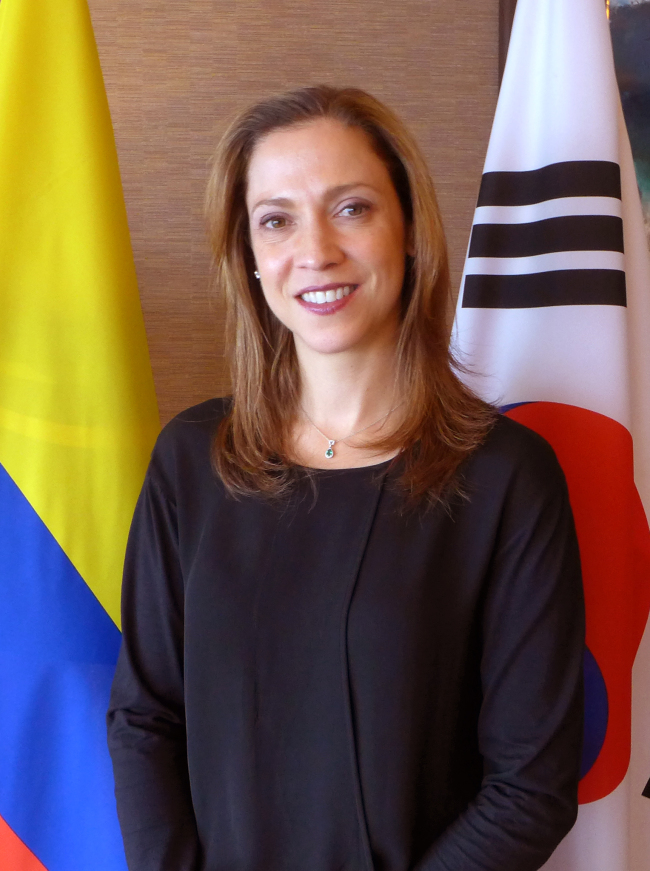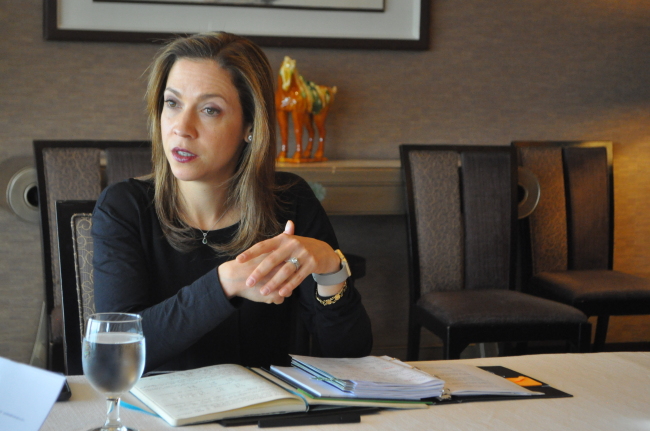[Herald Interview] ‘Colombian economy ripe for investment after peace deal’
By Joel LeePublished : May 29, 2017 - 17:52
Following the peace agreement with armed guerilla group FARC, Colombia has entered an environment of security and stability ideal for investors, according to the country’s trade minister.
In an interview with The Korea Herald last week, Colombian minister of trade, industry and tourism, Maria Claudia Lacouture, highlighted the freshly available opportunities in infrastructure, agriculture, housing, education and tourism in Colombia.
As the Latin American country is briskly moving ahead to secure peace after more than five decades of armed conflict, Colombia brims with energy of the rising middle classes and untapped opportunities, she said.
“Now that we have peace, there are more opportunities arising out of the post-conflict national development in Colombia,” Lacouture said, adding Bogota has identified 300 municipal zones across the country for development with tax and regulatory benefits offered.
In an interview with The Korea Herald last week, Colombian minister of trade, industry and tourism, Maria Claudia Lacouture, highlighted the freshly available opportunities in infrastructure, agriculture, housing, education and tourism in Colombia.
As the Latin American country is briskly moving ahead to secure peace after more than five decades of armed conflict, Colombia brims with energy of the rising middle classes and untapped opportunities, she said.
“Now that we have peace, there are more opportunities arising out of the post-conflict national development in Colombia,” Lacouture said, adding Bogota has identified 300 municipal zones across the country for development with tax and regulatory benefits offered.

Critical to the growing two-way commerce is the Colombia-Korea Free Trade Agreement that came into force on July 15 last year, Colombia’s first FTA with an Asian economy. Tariffs are eliminated on over 200 products under the accord, with enhanced health and environmental standards and efforts to remove nontariff barriers.
With the Colombian economy diversifying, export of non-oil products to Korea increased by nearly 30 percent last year from 2015. Colombia exports to Korea coffee, coffee-related products, cocoa products, metallurgical, iron and chemical products as well as fresh and processed fruits, among others.
Korea is the second-largest Asian investor in Colombia after Japan, with a cumulative direct investment of more than $210 million since 2000.
“Korea has successfully upgraded its economy at every critical juncture by selecting the right industrial models and executing the best strategies and technologies,” the Cornell University graduate said.
Noting that Colombia has 16 trade agreements worldwide with access to 1.5 billion consumers, Lacouture said one of the key priorities of her government is to penetrate regional and global value chains through trade and investment.
Colombia is part of the regional economic bloc of the Pacific Alliance, comprised of Mexico, Peru, Chile and Colombia, which allows tariff-free access across its member states and to the Latin American market. The alliance is also committed to bolstering trade and investment linkages with Asia-Pacific region economies.

Following the peace deal, Bogota has initiated the Colombia Take-off Program aimed at boosting economic growth through strengthened institutional support. The government encourages private and public investment in infrastructure, housing and agribusiness under the program, with special incentives offered to companies investing in areas devastated by the conflict.
Highlighting the country’s advanced telecommunications infrastructure, the bureaucrat encouraged Korean enterprises to invest in infrastructure projects worth over $20 billion.
The Bogota Metro project, a $7 billion scheme to build a subway system with the first line of 27 stations stretching 32 kilometers, is open to international investment with a serviceable timeframe of 2020. The second phase of upgrading El Dorado International Airport in Bogota with a new terminal is another major project.
There are some 30 highways stretching over 5,000 kilometers being planned for construction across the country, alongside schemes to build new ports on the Atlantic and Pacific Oceans, seven new airports and a host of other railroads.
In agriculture, a total of 30 million hectares of land will be used for the agri-food industry, with new land additionally available from the previously guerilla-controlled territories and conflict zones.
The Colombian government has also started working on providing over 1 million housing units to poor families, as well as scholarships to talented students from low-income households.
By Joel Lee (joel@heraldcorp.com)







![[KH Explains] Hyundai's full hybrid edge to pay off amid slow transition to pure EVs](http://res.heraldm.com/phpwas/restmb_idxmake.php?idx=644&simg=/content/image/2024/04/18/20240418050645_0.jpg&u=20240419100350)






![[From the Scene] Monks, Buddhists hail return of remains of Buddhas](http://res.heraldm.com/phpwas/restmb_idxmake.php?idx=652&simg=/content/image/2024/04/19/20240419050617_0.jpg&u=20240419175937)

![[KH Explains] Hyundai's full hybrid edge to pay off amid slow transition to pure EVs](http://res.heraldm.com/phpwas/restmb_idxmake.php?idx=652&simg=/content/image/2024/04/18/20240418050645_0.jpg&u=20240419100350)

![[Today’s K-pop] Illit drops debut single remix](http://res.heraldm.com/phpwas/restmb_idxmake.php?idx=642&simg=/content/image/2024/04/19/20240419050612_0.jpg&u=)